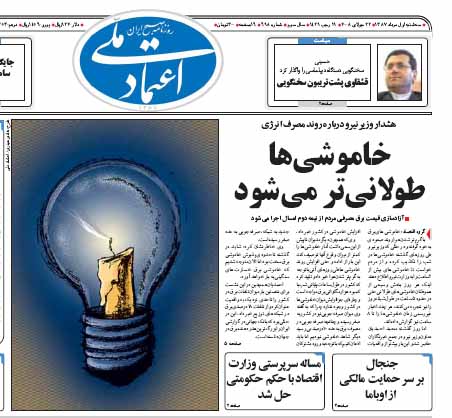Blackouts in Iran
It was hard to miss the dramatic picture and headline screaming “Blackouts becoming longer” in Etemaad-e Melli. It alleges the Energy Ministry is minimizing the real impact of the blackouts, citing unofficial reports that power cuts are now reaching eight hours in some places. It’s shaping up to be a hot summer and its not even August yet.
Ahmadinejad’s gas rationing program, which caused riots when it was introduced in June of last year, is still in effect, and is reported to have stoked the black market for petrol. Former energy minister Kazem Vaziri Hamaneh warned that Iran was facing an energy “catastrophe” as he was replaced in a cabinet reshuffle two months later.
This type of storyline tends to arouse those in the US Congress who see energy as a pressure point and the nutty idea that America could enforce some type of gasoline blockage against Iran, which would make them give up nuclear. Given that Iran argues it needs a self-sufficient nuclear power capacity to ease its energy problems and hedge against foreign energy meddling, I doubt this would work.
View from Iran has more on Iran’s economic situation, and Iran Nuclear Watch is closely following the extremely misguided HR 362 sanctions act that would require the U.S. to lead an “international effort” to blockade petroleum products going into Iran.

